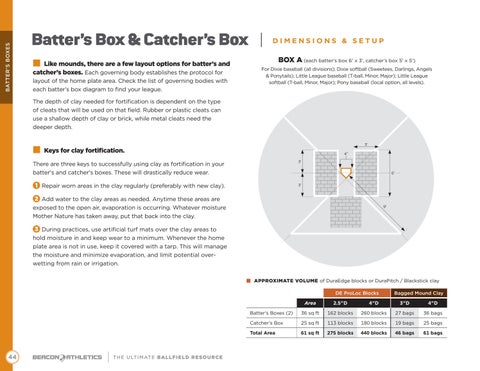BATTER’S BOXES
Batter’s Box & Catcher’s Box | Like mounds, there are a few layout options for batter’s and catcher’s boxes. Each governing body establishes the protocol for
layout of the home plate area. Check the list of governing bodies with each batter’s box diagram to find your league.
DIMENSIONS & SETUP
BOX A (each batter’s box 6' x 3', catcher’s box 5' x 5') For Dixie baseball (all divisions); Dixie softball (Sweetees, Darlings, Angels & Ponytails); Little League baseball (T-ball, Minor, Major); Little League softball (T-ball, Minor, Major); Pony baseball (local option, all levels).
The depth of clay needed for fortification is dependent on the type of cleats that will be used on that field. Rubber or plastic cleats can use a shallow depth of clay or brick, while metal cleats need the deeper depth.
3'
Keys for clay fortification.
4"
There are three keys to successfully using clay as fortification in your batter's and catcher's boxes. These will drastically reduce wear.
3'
1 Repair worn areas in the clay regularly (preferably with new clay).
3'
6'
2 Add water to the clay areas as needed. Anytime these areas are exposed to the open air, evaporation is occurring. Whatever moisture Mother Nature has taken away, put that back into the clay.
9'
3 During practices, use artificial turf mats over the clay areas to hold moisture in and keep wear to a minimum. Whenever the home plate area is not in use, keep it covered with a tarp. This will manage the moisture and minimize evaporation, and limit potential overwetting from rain or irrigation. APPROXIMATE VOLUME of DuraEdge blocks or DuraPitch / Blackstick clay DE ProLoc Blocks
44
|
T HE ULT I M AT E BA L L F I E L D R E S OUR C E
Bagged Mound Clay
Area
2.5"D
4"D
3"D
4"D
Batter’s Boxes (2)
36 sq ft
162 blocks
260 blocks
27 bags
36 bags
Catcher’s Box
25 sq ft
113 blocks
180 blocks
19 bags
25 bags
Total Area
61 sq ft
275 blocks
440 blocks
46 bags
61 bags
















